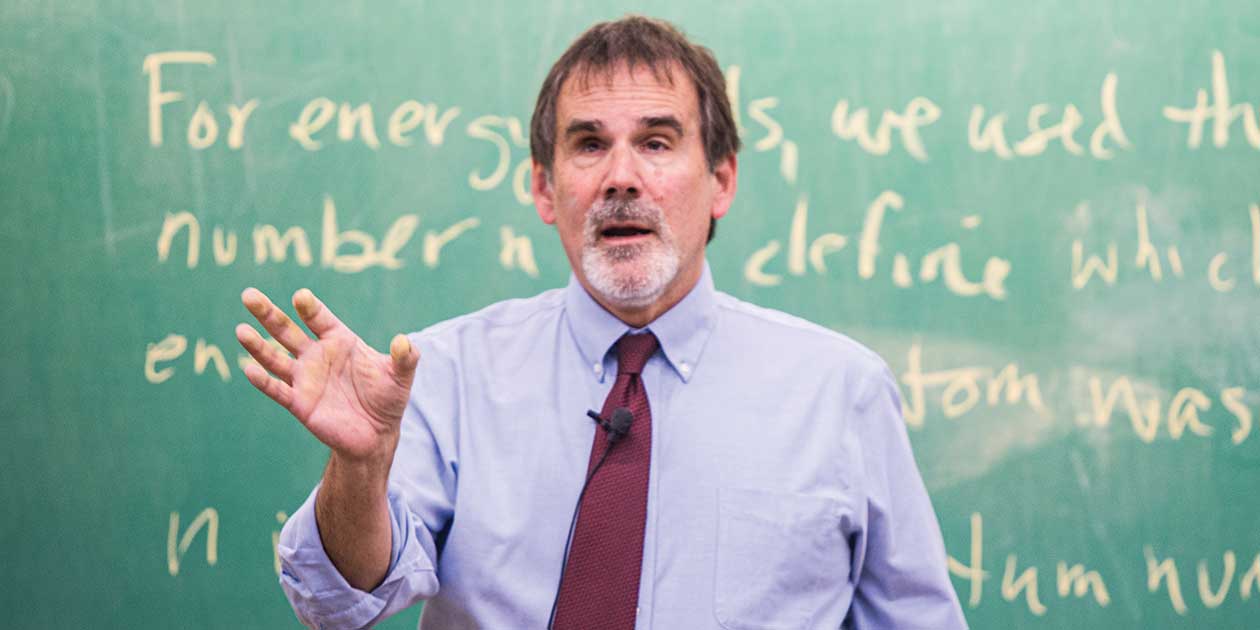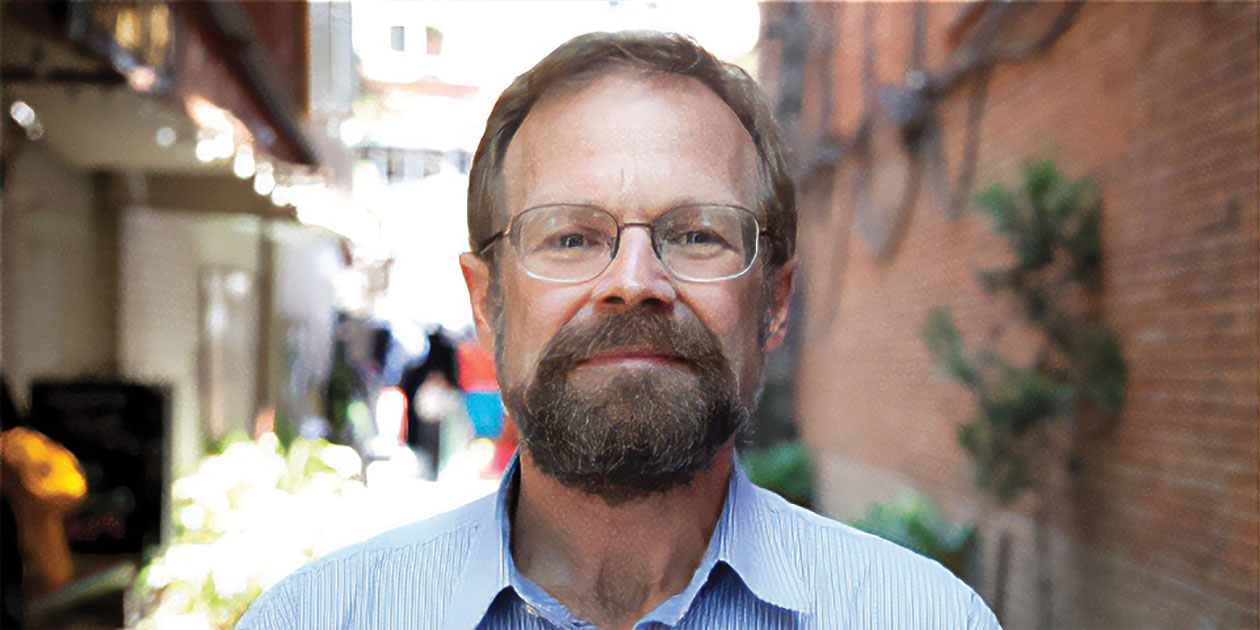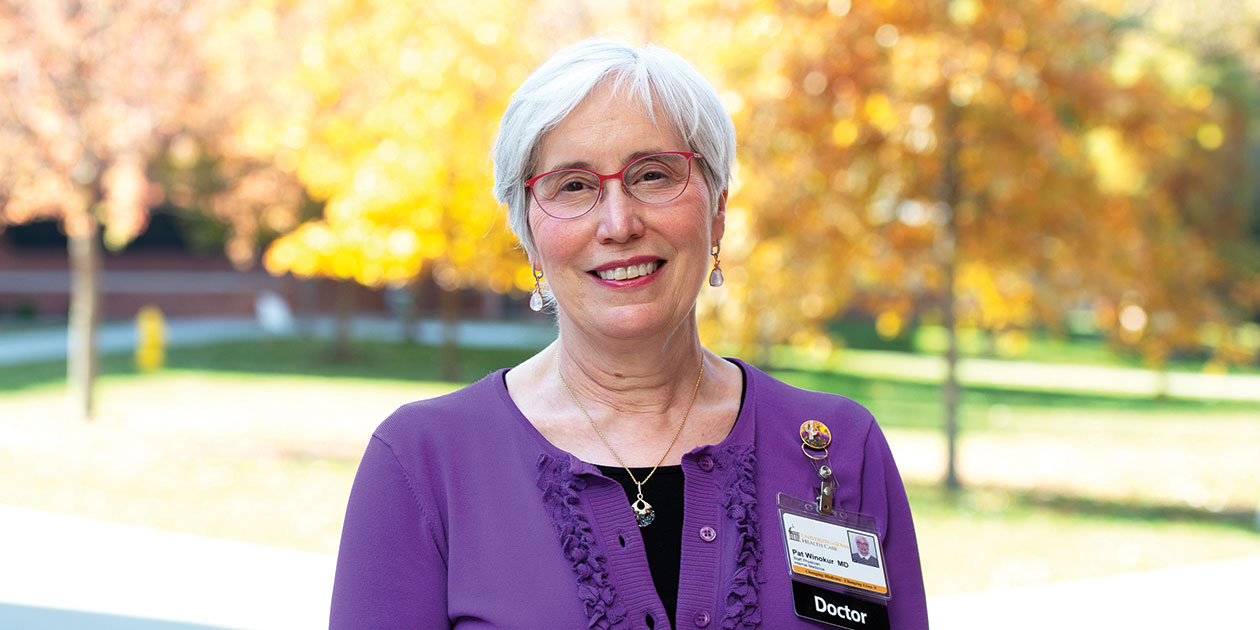Three Leading Professors on the Future of the University of Iowa
This February, the annual Presidential Lecture series will mark 175 years of the University of Iowa with presentations on the achievements of three of Iowa's most notable programs.
In advance of the lectures, Iowa Magazine asked the faculty speakers to share how Iowa's strong historic contributions in their respective fields will help shape the future. Here's how they responded.
THE PLACE FOR SPACE
Craig Kletzing, Donald A. and Marie B. Gurnett Chair and professor of physics and astronomy
 PHOTO: TIM SCHOON/UI OFFICE OF STRATEGIC COMMUNICATION
As principal investigator for NASA's TRACERS mission, UI physics and astronomy professor Craig Kletzing secured the largest research grant in the university's history in 2019 to study the mysterious, powerful interactions between the magnetic fields of the sun and Earth.
PHOTO: TIM SCHOON/UI OFFICE OF STRATEGIC COMMUNICATION
As principal investigator for NASA's TRACERS mission, UI physics and astronomy professor Craig Kletzing secured the largest research grant in the university's history in 2019 to study the mysterious, powerful interactions between the magnetic fields of the sun and Earth.
The University of Iowa Department of Physics and Astronomy has a long history in providing spaceflight instruments to NASA missions. This extends all the way back to the beginning of space measurements on Explorer 1. The tradition continues with a wide range of missions both in space plasma and astronomy. The hire of a number of young, outstanding faculty over the past few years has ensured a bright future for the UI's leading role in U.S. space science research.
THE WRITING UNIVERSITY
Christopher Merrill, director of the International Writing Program and professor of English
 PHOTO: RAM DEVINENI/CHRISTOPHERMERRILLBOOKS.COM
International Writing Program Director Christopher Merrill has conducted cultural diplomacy missions to more than 50 countries. A guiding force behind Iowa City's designation as a UNESCO City of Literature in 2008, he's since served on the U.S. National Commission for UNESCO and the National Council on the Humanities.
PHOTO: RAM DEVINENI/CHRISTOPHERMERRILLBOOKS.COM
International Writing Program Director Christopher Merrill has conducted cultural diplomacy missions to more than 50 countries. A guiding force behind Iowa City's designation as a UNESCO City of Literature in 2008, he's since served on the U.S. National Commission for UNESCO and the National Council on the Humanities.
The University of Iowa's 175th anniversary coincides with the 100th anniversary of a revolutionary change in higher education, which was set in motion by Graduate College Dean Carl Seashore's decision in 1922 to accept creative work as a thesis for an advanced degree. Two early recipients of this new degree, Paul Engle (32MA) and Wallace Stegner (32MA, 35PhD), not only succeeded as writers but directed or founded the most consequential writing programs in this country—the Iowa Writers' Workshop, the International Writing Program, and Stanford University's Stegner Fellowships.
These programs inspired the migration of writers into academia, here and abroad, and now there are more than 350 graduate creative writing programs in this country, which offer students a variety of ways to serve apprenticeships in the art and craft of writing poetry, fiction, nonfiction, and plays. The UI came to be known as the Writing University, and in 2008 Iowa City was designated the first UNESCO City of Literature in North America.
The study of creativity is central to discussions of craft; hence in workshops and seminars, readings and panel discussions, writers explore the deeper promptings of the spirit, determined to make sense of their experience, researched, remembered, or imagined. "The creative process is the process of change, of development, of evolution, in the organization of subjective life," wrote the poet and scholar Brewster Ghiselin, who visited the UI long ago to see how writers practice what he called "the life of discovery." No telling where it may lead.
HEALTH CARE LEADER
Patricia Winokur (88R, 91F), executive dean of the Roy J. and Lucille A. Carver College of Medicine, physician and professor of internal medicine-infectious diseases, and leader of Iowa's COVID-19 vaccine clinical trials
 PHOTO: SUSAN MCCLELLEN/UI HEALTH CARE
As executive dean of the Carver College of Medicine, Patricia Winokur directs efforts that shape the UI's academic medicine mission of research, education, and patient care. A nationally recognized leader in the field of infectious diseases, Winokur created the UI Vaccine and Treatment Evaluation Unit, one of the top vaccine research programs in the country and one of only nine nationwide funded by the National Institute of Allergy and Infectious Diseases.
PHOTO: SUSAN MCCLELLEN/UI HEALTH CARE
As executive dean of the Carver College of Medicine, Patricia Winokur directs efforts that shape the UI's academic medicine mission of research, education, and patient care. A nationally recognized leader in the field of infectious diseases, Winokur created the UI Vaccine and Treatment Evaluation Unit, one of the top vaccine research programs in the country and one of only nine nationwide funded by the National Institute of Allergy and Infectious Diseases.
University of Iowa Health Care boasts a rich history, dating back to the first medical school class on campus in 1870.
The original Medical Department was open to men and women, making Iowa one of the first coeducational medical schools in the nation—and ostensibly the first such college west of the Mississippi River. Eight of the 37 students in the first class were women; today, women represent half of the Carver College of Medicine's class of MD students.
The completion of a new University Hospital in 1928— following the construction several years earlier of a state psychiatric hospital, children's hospital, nurses' dormitory, and medical laboratories building—firmly established the medical campus west of the Iowa River, bringing more patients and more clinical teaching opportunities.
Medical breakthroughs and programs of national distinction would follow. Iowa was home to one of the nation's first blood banks in 1939. Buffered aspirin was developed at the university in 1944. One of the world's first institutes devoted to agricultural health and safety was established at Iowa in 1955. In the 1960s, UI medical faculty ushered in the modern era of bariatric surgery. The Cardiovascular Research Center, established in 1974, yielded important findings related to cardiovascular regulation, hypertension, and vascular biology.
Research and clinical advances—in blinding eye diseases, cystic fibrosis, genetics, orthopedics, otolaryngology, and psychiatry, among others—helped strengthen Iowa's reputation as a center of innovation and collaboration. More recently, the multidisciplinary Iowa Neuroscience Institute and Pappajohn Biomedical Institute at Iowa have made medical research and discovery a university-wide effort.
And when the coronavirus pandemic emerged in 2020, UI Health Care experts quickly launched COVID-19 testing and treatment services and helped broaden understanding of the novel coronavirus among the scientific community and the general public. To have physician Stanley Perlman—a world-renowned authority on the biology and immunology of coronaviruses— guiding the country on what we should expect from different vaccines and therapeutics is remarkable. In addition, our clinical researchers helped generate data for antivirals, monoclonal antibodies, and various COVID-19 vaccines that led to the FDA approval of these products in record time. Our campus and state should be proud of all the innovations, flexibility, and hard work exhibited by our faculty, staff, and students during the pandemic.
Today, research is a hallmark of UI Health Care, garnering over $283 million in external funding in fiscal year 2021. And through collaborations with providers and health systems across the state, clinical education remains central to teaching and training resident and fellow physicians as well as students in MD and other Carver College of Medicine degree programs. Combined with comprehensive and nationally ranked adult and pediatric patient care services on campus and across the state, UI Health Care is poised to continue serving Iowans—and the world—well into the future.
